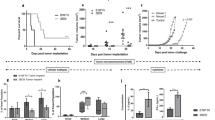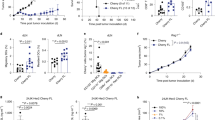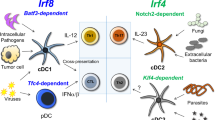Abstract
Dendritic cell (DC) vaccines have shown great promise in generating antitumor immune responses but have generally fallen short of producing durable cures. Determining mechanisms by which these vaccines fail will provide one strategy toward improving their success. Several manipulations of DCs have improved their migration and longevity, but the immune inhibitory environment surrounding tumors provides a powerful suppressive influence. To determine the mechanisms by which DCs at the site of the tumor convert to a suppressive phenotype, we evaluated pathways in DCs that become expressed at the tumor site. Our results revealed that tumors lead to induction of the glucocorticoid-induced leucine zipper (GILZ) gene in DCs, and that this gene is critical for the development of tumor-induced tolerance of both DCs and T cells. Previous data suggested that GILZ is a pivotal gene in the balance between activation and tolerance of DCs. Our new data show that GILZ is highly upregulated in DCs in the tumor microenvironment in vivo and that blockade of this gene in DC vaccines significantly improves long-term survival. These results suggest that GILZ may be an ideal candidate gene to target for novel immune-based tumor therapies.
This is a preview of subscription content, access via your institution
Access options
Subscribe to this journal
Receive 12 print issues and online access
$259.00 per year
only $21.58 per issue
Buy this article
- Purchase on Springer Link
- Instant access to full article PDF
Prices may be subject to local taxes which are calculated during checkout





Similar content being viewed by others
Accession codes
References
Wheeler CJ, Black KL, Liu G, Mazer M, Zhang XX, Pepkowitz S et al. Vaccination elicits correlated immune and clinical responses in glioblastoma multiforme patients. Cancer Res 2008; 68: 5955–5964.
Yu JS, Wheeler CJ, Zeltzer PM, Ying H, Finger DN, Lee PK et al. Vaccination of malignant glioma patients with peptide-pulsed dendritic cells elicits systemic cytotoxicity and intracranial T-cell infiltration. Cancer Res 2001; 61: 842–847.
Yamanaka R, Homma J, Yajima N, Tsuchiya N, Sano M, Kobayashi T et al. Clinical evaluation of dendritic cell vaccination for patients with recurrent glioma: results of a clinical phase I/II trial. Clin Cancer Res 2005; 11: 4160–4167.
Walker DG, Laherty R, Tomlinson FH, Chuah T, Schmidt C . Results of a phase I dendritic cell vaccine trial for malignant astrocytoma: potential interaction with adjuvant chemotherapy. J Clin Neurosci 2008; 15: 114–121.
Mule JJ . Dendritic cell-based vaccines for pancreatic cancer and melanoma. Ann N Y Acad Sci 2009; 1174: 33–40.
Nestle FO, Alijagic S, Gilliet M, Sun Y, Grabbe S, Dummer R et al. Vaccination of melanoma patients with peptide- or tumor lysate-pulsed dendritic cells. Nat Med 1998; 4: 328–332.
Pecher G, Haring A, Kaiser L, Thiel E . Mucin gene (MUC1) transfected dendritic cells as vaccine: results of a phase I/II clinical trial. Cancer Immunol Immunother 2002; 51: 669–673.
Schwaab T, Schwarzer A, Wolf B, Crocenzi TS, Seigne JD, Crosby NA et al. Clinical and immunologic effects of intranodal autologous tumor lysate-dendritic cell vaccine with Aldesleukin (Interleukin 2) and IFN-{alpha}2a therapy in metastatic renal cell carcinoma patients. Clin Cancer Res 2009; 15: 4986–4992.
Burgdorf SK, Fischer A, Myschetzky PS, Munksgaard SB, Zocca MB, Claesson MH et al. Clinical responses in patients with advanced colorectal cancer to a dendritic cell based vaccine. Oncol Rep 2008; 20: 1305–1311.
Lehrfeld TJ, Lee DI . Dendritic cell vaccines for the treatment of prostate cancer. Urol Oncol 2008; 26: 576–580.
Palmer DH, Midgley RS, Mirza N, Torr EE, Ahmed F, Steele JC et al. A phase II study of adoptive immunotherapy using dendritic cells pulsed with tumor lysate in patients with hepatocellular carcinoma. Hepatology 2009; 49: 124–132.
Hus I, Schmitt M, Tabarkiewicz J, Radej S, Wojas K, Bojarska-Junak A et al. Vaccination of B-CLL patients with autologous dendritic cells can change the frequency of leukemia antigen-specific CD8+ T cells as well as CD4+CD25+FoxP3+ regulatory T cells toward an antileukemia response. Leukemia 2008; 22: 1007–1017.
Palma M, Adamson L, Hansson L, Kokhaei P, Rezvany R, Mellstedt H et al. Development of a dendritic cell-based vaccine for chronic lymphocytic leukemia. Cancer Immunol Immunother 2008; 57: 1705–1710.
Papewalis C, Wuttke M, Jacobs B, Domberg J, Willenberg H, Baehring T et al. Dendritic cell vaccination induces tumor epitope-specific Th1 immune response in medullary thyroid carcinoma. Horm Metab Res 2008; 40: 108–116.
Dees EC, McKinnon KP, Kuhns JJ, Chwastiak KA, Sparks S, Myers M et al. Dendritic cells can be rapidly expanded ex vivo and safely administered in patients with metastatic breast cancer. Cancer Immunol Immunother 2004; 53: 777–785.
Van Driessche A, Van de Velde AL, Nijs G, Braeckman T, Stein B, De Vries JM et al. Clinical-grade manufacturing of autologous mature mRNA-electroporated dendritic cells and safety testing in acute myeloid leukemia patients in a phase I dose-escalation clinical trial. Cytotherapy 2009; 11: 653–668.
Melief CJ . Cancer immunotherapy by dendritic cells. Immunity 2008; 29: 372–383.
Kim SO, Ono K, Tobias PS, Han J . Orphan nuclear receptor Nur77 is involved in caspase-independent macrophage cell death. J Exp Med 2003; 197: 1441–1452.
Kim TW, Hung CF, Boyd D, Juang J, He L, Kim JW et al. Enhancing DNA vaccine potency by combining a strategy to prolong dendritic cell life with intracellular targeting strategies. J Immunol 2003; 171: 2970–2976.
Kim TW, Lee JH, He L, Boyd DA, Hardwick JM, Hung CF et al. Modification of professional antigen-presenting cells with small interfering RNA in vivo to enhance cancer vaccine potency. Cancer Res 2005; 65: 309–316.
Wang T, Jiang Q, Chan C, Gorski KS, McCadden E, Kardian D et al. Inhibition of activation-induced death of dendritic cells and enhancement of vaccine efficacy via blockade of MINOR. Blood 2009; 113: 2906–2913.
Shortman K, Lahoud MH, Caminschi I . Improving vaccines by targeting antigens to dendritic cells. Exp Mol Med 2009; 41: 61–66.
Terando A, Roessler B, Mule JJ . Chemokine gene modification of human dendritic cell-based tumor vaccines using a recombinant adenoviral vector. Cancer Gene Ther 2004; 11: 165–173.
D’Adamio F, Zollo O, Moraca R, Ayroldi E, Bruscoli S, Bartoli A et al. A new dexamethasone-induced gene of the leucine zipper family protects T lymphocytes from TCR/CD3-activated cell death. Immunity 1997; 7: 803–812.
Ayroldi E, Riccardi C . Glucocorticoid-induced leucine zipper (GILZ): a new important mediator of glucocorticoid action. Faseb J 2009; 23: 3649–3658.
Shibanuma M, Kuroki T, Nose K . Isolation of a gene encoding a putative leucine zipper structure that is induced by transforming growth factor beta 1 and other growth factors. J Biol Chem 1992; 267: 10219–10224.
Schoenenberger GA, Cueni LB, Monnier M, Hatt AM . Humoral transmission of sleep. VII. Isolation and physical-chemical characterization of the ‘sleep inducing factor delta’. Pflugers Arch 1972; 338: 1–17.
Asselin-Labat ML, Biola-Vidamment A, Kerbrat S, Lombes M, Bertoglio J, Pallardy M . FoxO3 mediates antagonistic effects of glucocorticoids and interleukin-2 on glucocorticoid-induced leucine zipper expression. Mol Endocrinol 2005; 19: 1752–1764.
Cannarile L, Cuzzocrea S, Santucci L, Agostini M, Mazzon E, Esposito E et al. Glucocorticoid-induced leucine zipper is protective in Th1-mediated models of colitis. Gastroenterology 2009; 136: 530–541.
Cohen N, Mouly E, Hamdi H, Maillot MC, Pallardy M, Godot V et al. GILZ expression in human dendritic cells redirects their maturation and prevents antigen-specific T lymphocyte response. Blood 2006; 107: 2037–2044.
Hamdi H, Bigorgne A, Naveau S, Balian A, Bouchet-Delbos L, Cassard-Doulcier AM et al. Glucocorticoid-induced leucine zipper: a key protein in the sensitization of monocytes to lipopolysaccharide in alcoholic hepatitis. Hepatology 2007; 46: 1986–1992.
Berrebi D, Bruscoli S, Cohen N, Foussat A, Migliorati G, Bouchet-Delbos L et al. Synthesis of glucocorticoid-induced leucine zipper (GILZ) by macrophages: an anti-inflammatory and immunosuppressive mechanism shared by glucocorticoids and IL-10. Blood 2003; 101: 729–738.
Godot V, Garcia G, Capel F, Arock M, Durand-Gasselin I, Asselin-Labat ML et al. Dexamethasone and IL-10 stimulate glucocorticoid-induced leucine zipper synthesis by human mast cells. Allergy 2006; 61: 886–890.
Whartenby KA, Straley EE, Kim H, Racke F, Tanavde V, Gorski KS et al. Transduction of donor hematopoietic stem-progenitor cells with Fas ligand enhanced short-term engraftment in a murine model of allogeneic bone marrow transplantation. Blood 2002; 100: 3147–3154.
Smits EL, Anguille S, Cools N, Berneman ZN, Van Tendeloo VF . Dendritic cell-based cancer gene therapy. Hum Gene Ther 2009; 20: 1106–1118.
Zhang W, Chen Z, Li F, Kamencic H, Juurlink B, Gordon JR et al. Tumour necrosis factor-alpha (TNF-alpha) transgene-expressing dendritic cells (DCs) undergo augmented cellular maturation and induce more robust T-cell activation and anti-tumour immunity than DCs generated in recombinant TNF-alpha. Immunology 2003; 108: 177–188.
Acknowledgements
This work was funded by R01CA111989.
Author information
Authors and Affiliations
Corresponding author
Ethics declarations
Competing interests
The authors declare no conflict of interest.
Rights and permissions
About this article
Cite this article
Lebson, L., Wang, T., Jiang, Q. et al. Induction of the glucocorticoid-induced leucine zipper gene limits the efficacy of dendritic cell vaccines. Cancer Gene Ther 18, 563–570 (2011). https://doi.org/10.1038/cgt.2011.23
Received:
Revised:
Accepted:
Published:
Issue Date:
DOI: https://doi.org/10.1038/cgt.2011.23
Keywords
This article is cited by
-
Comprehensive bioinformatic analysis of the expression and prognostic significance of TSC22D domain family genes in adult acute myeloid leukemia
BMC Medical Genomics (2023)
-
A dual role for glucocorticoid-induced leucine zipper in glucocorticoid function: tumor growth promotion or suppression?
Cell Death & Disease (2018)
-
Microenvironmental derived factors modulating dendritic cell function and vaccine efficacy: the effect of prostanoid receptor and nuclear receptor ligands
Cancer Immunology, Immunotherapy (2018)



